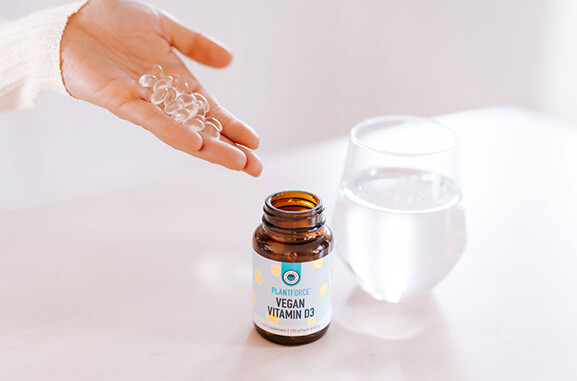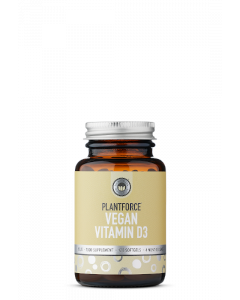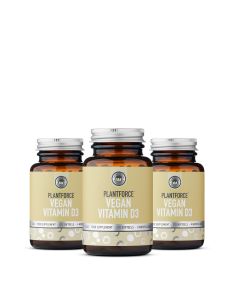- Shipped today!
- Free shipping from € 45
- Postpay possibility
- Review score 9.4
- Earn reward points
- Shipped today!
- Free shipping from € 45
- Postpay possibility
- Review score 9.4
- Earn reward points
- Home
- Brands
- P
- Plantforce
- Vitamin D


What is Plantforce Vegan Vitamin D3?
Plantforce Vegan Vitamin D3 is extracted from a sustainable source: Lichens. Specifically, it provides Vitamin D in Vitamin D3, also known as Cholecalciferol.
Benefits of Plantforce Vegan Vitamin D3:
- High-quality Plant-based Vitamin D from lichen
- Natural & Vegan-friendly
- No artificial sweeteners or flavors
- Neutral taste
- Soy-free
- 2000 IU (50 mcg) per capsule
- Easily digested
- Coconut-based MCT oil (for enhanced absorption)
- Small capsule
What is Vitamin D?
Vitamin D, or the "sunshine vitamin," is a fat-soluble vitamin that aids in regulating calcium absorption and is essential for maintaining bone health. Not only that, but it may also help in reducing stress too! (Source: Poseidon)
This dietary supplement in Vitamin D3 provides a natural and organic source of Vitamin D closest to our body's production. In addition, Vitamin D3, as research suggests, is more absorbable compared to Vitamin D2.
What is the difference between vitamin D2 and D3?
In foods and supplements, vitamin D comes as either vitamin D2 or D3, which are very similar in their chemical structure. However, both need to be converted to the active hormone in the liver and kidneys, as does that absorbed from the skin. We get vitamin D2 from plant sources and vitamin D3 from animal foods such as meat, fish, and dairy.
And while there is not exhaustive evidence, there is some to show that vitamin D3 may contribute more effectively to vitamin D stores in the body (Source: Examine.com).
Can Vitamin D3 be vegan?
Yes. Vitamin D3 can be vegan-friendly. Originally, Vitamin D in supplements came from cod liver oil, and while some come from the washed-off Vitamin D from the lanolin of a lambs' wool.
Who needs Vitamin D3?
Over 1 Billion people are deficient in vitamin D3 around the world! Researchers suggest that Vitamin D supplementation is the best option to get the daily requirement. This is because there may be challenges that hinder us from getting enough Vitamin D:
- Sunlight is also limited during Winter Season, specifically from October to March. There is a higher prevalence of low Vitamin D blood levels.
- People who live closed doors or work mainly in the office or remotely from home rarely get enough sunlight
- People who have darker skin have a higher chance of lower Vitamin D levels in the blood because the dark pigment of their skin acts as a shade, thus reducing Vitamin D production.
- People with a body mass index of over 30 are associated with lower Vitamin D levels. This is because fat cells under the skin isolate the Vitamin D produced and hinder them from using the body.
- Aging can also decrease Vitamin D production of the skin, especially for the elderly. 65-70 years old
(Source: NCBI)
Are Vitamin D3 supplements more effective than Vitamin D2?
Yes. In fact, there is a study showing long-term Vitamin D3 supplementation effectively maintains serum 25-hydroxyvitamin D status over the winter months. It's been proven to be even more effective than Vitamin D2 supplements. (Source: Cambridge, JCEM)
Did you know?
But a fun fact about fish is that they cannot synthesize (or create) their own Vitamin D. They get it from their food source. Researchers found that it originates from the beginning of the food chain, which is Algae exposed to Ultraviolet-B radiation from the sea.
What are these algae?
These algae are specifically called Reindeer Lichens. Vitamin D3 from lichens is the closest and most natural vitamin D3 because they produce Vitamin D3, similar to humans' exposure to the sun. (Source: NCBI)



